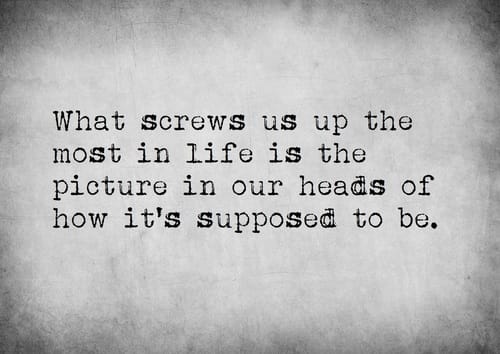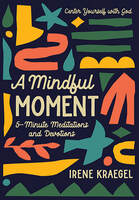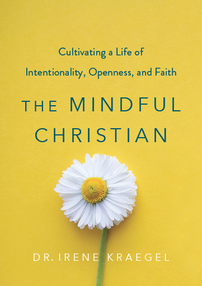|
I have a very specific picture in my head of how Christmas is supposed to be. Chances are, I don't have to describe it to you because you already know. But just to be clear, the picture looks like this: We are all super happy. This happiness, of course, involves snow outside, a cute snowman, a fireplace, hot chocolate, a perfectly decorated Christmas tree, a loving family, the singing of carols, delicious food, and deeply meaningful (yet surprising) gifts. Wow, talk about an unattainable vision. It is no surprise that so many of us get depressed during the Christmas season. Perhaps the bigger shock is why we're not all completely incapacitated by depression during the Christmas season. Because as someone once said (maybe Socrates?), "what screws us up the most in life is the picture in our heads of how it's supposed to be."  My Christmas tree this year looked smaller in the field than in my living room -- the trunk didn't fit in the tree stand, so we had to shave down the outside of the trunk to squeeze it in (requiring a few trips in and out the front door on a freezing cold night). As we decorated it, I stepped on a 35-year-old handmade ornament from my husband's childhood and broke it. We topped off the tree with our only tree-topper, a pale blonde angel that triggers anxiety for me about white privilege every Christmas season (when will I just buy a star?). A couple days later, all of the lights on the bottom half of the tree stopped working, leaving only the top half lit. In the meantime, our freshly-cut tree was quickly dry to the bone -- it was dropping needles faster than we could pick them up, and branches became rapidly bare. And the Christmas presents I bought were okay but not quite right. (Did I get too many? Too materialistic? Or did I not get enough? Too stingy? Will my child be messed up because of the gift choices we've made?) There's no fireplace in my house. The hot chocolate we make is often too hot and too rich, and our feeble snowman attempts fall over within a few hours. Inevitably, the "white Christmas" of our dreams turns to a "slush Christmas," and the family doesn't get along as well as would be hoped. We all feel self-conscious (or cynical) about singing carols, so we don't. To sum up: Christmas is not always super happy. In fact, sometimes I find a feeling of deep emptiness and despair during Christmas time that freaks me out. Nobody sings about this on the radio at Christmastime. I am learning to expect imperfections and even despairing feelings at Christmas, and this makes all the difference in my ability to enjoy the holiday. It is an attitude of mindfulness that allows me to be with what is instead of with the thoughts of what should be. Without mindfulness, I am prone to negatively judge the malfunctioning Christmas tree lights, the lack of carols, and the difficult family dynamics. With mindfulness, I expect these troubles and am okay with them (even curious about them) as they are. And isn't this what Jesus asked of us as he neared his own earthly life of difficulties? "...in me you may have peace. In this world, you will have trouble. But take heart! I have overcome the world." (John 16:33) Perhaps Christmas is a golden opportunity for us to practice noticing our expectations, laying them aside, and accepting things just as they are. It is what was asked of the Jewish people when Jesus appeared -- notice the expectation of a political Messiah, lay it aside, and accept the gift of this homeless infant Messiah laying in an animal's feeding trough. We struggle with this. Our carols still sing of Christ's arrival as a quiet and peaceful event. But in reality, births are not quiet, especially in stables in overcrowded towns. And we still long for a political Messiah today. Perhaps we know by now that God isn't sending one directly, but we think maybe we will be saved by a different political leader, maybe an Obama or a Trump -- and we are surprised and terrified when the "wrong" political leader doesn't save us or even threatens to cause harm. Let's practice expecting the "trouble" that Jesus predicted and also accepting that we are okay. We can (and will) have trouble, and still have peace. We can (and will) experience grief, disappointment, anger, and fear, and still have peace. We can (and will) find that the world is a broken mess, and still experience beauty and joy amidst it all. This is mindfulness. This is also Christian faith. "...in me you may have peace. In this world, you will have trouble. But take heart! I have overcome the world." With mindfulness and with Christianity, we practice an attitude of radical acceptance -- accepting things just as they are, recognizing that God is with us right here. Bringing a readiness to change what we can along with an openness to being with life as it is. If you would like a meditation to support your acceptance (and enjoyment) of life as it is during this holiday season, you might try one here by Mark Williams. Whether or not all your Christmas lights work this year, and whatever you are feeling or not feeling during this season -- may you know the presence of the Christ-child with you. "In this world, you will have trouble. But take heart! I have overcome the world."
4 Comments
|
Author
I am Irene Kraegel. I am licensed as a clinical psychologist and teach mindfulness on a faith-based university campus. I practice mindfulness because it opens me up to God (a.k.a. brings joy). I am writing here in hopes of sharing some of my experiences and thoughts related to the practice of mindfulness in the life of a Christian. Thanks for reading! Books
Blog archives
December 2023
|



